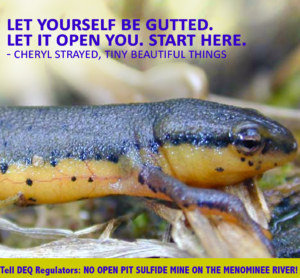

January 27, 2017
Ontario Securities Commission
Inquiries Unit
20 Queen Street West; 20th floor
Toronto, Ontario M5H 358
Dear Sir or Madam:
We are writing regarding a possible case of fraud or misleading information by a company listed on the Toronto Stock Exchange. The case concerns the false or contradictory statements made in Aquila Resources’ Back Forty mine permit application for an open pit gold and zinc sulfide mine to the Michigan Department of Environmental Quality (MDEQ).
According to Aquila’s permit application, “The (Back Forty) Project will be an open pit mining operation” and the Life of Mine (LOM) operation is planned to be approximately 7 years but the Back Forty is actually described as a 16 year mine in every single press release published by Aquila Resources, in their letters to investors and local community leaders, and in Aquila’s communications with the Menominee Indian Tribe of Wisconsin.
In the same permit application of October 2015 (p. 22) Aquila states that “The Project does not include underground mining, consequently, material damage to structures or natural features resulting from underground mining will not occur.”
This is misleading. In Aquila’s news release of January 24, 2017 (“Aquila Resources Announces $6.6 Million Non-Brokered Private Placement”) the company describes the Back Forty project “based on mining 16.1 M tonnes of measured, indicated, and inferred resources over the 16 year life of mine, of which 12.5 M tonnes will be open-pit and 3.6 M tonnes will be underground.” Significantly, the 16 year LOM is described in Aquila’s current NI 43-101 report, required by Canadian Securities Administrators.
Aquila’s mine permit application asserts that mining and milling facilities are scaled to accommodate the life of the mine, i.e. their facility is designed for a 7 year mine. By minimizing LOM, the company can misrepresent all of the mine’s impacts, including tailings capacity, size of waste rock storage areas, total limestone needed for neutralizing total waste rock, total need for importing and storing cyanide and other chemicals used in the processing of ore, total crushing and processing throughput, milling equipment capacity, water treatment plant capacity, dewatering and drawdown estimates, air pollution quantities, noise, pit backfilling estimates, remediation planning, post-closure timelines, and more.
In issuing the mining permit, MDEQ stated: “This permit allows for only open pit mining methods at the Back Forty Project.”
Aquila Resources is lying to the MDEQ by failing to accurately disclose their plans for the Back Forty project – probably because the company wants to secure a mining permit as quickly as possible, while downplaying the true environmental impacts. Aquila is focusing on mining surface-accessible ore first, because the operating and capital costs are lower—this company is cash short and needs to get a mining permit before they’ll receive an infusion of cash from their investors.
In the summer of 2016 the MDEQ sent a list of 197 questions to Aquila, addressing many errors, omissions and points of confusion about the Back Forty mine permit application. Comment # 176 asked “Mining method – preliminary assessment of underground mining showed that it is not a prudent alternative for this ore body – What is the reference for this assessment?”
Aquila’s response to the MDEQ on May 9, 2016: “The sinking of an underground mine shaft was evaluated in the 2014 Preliminary Economic Assessment (PEA) as reported by Tetra Tech (2014). Although the ore body was found to extend downward beyond the bottom of the pit and was deemed mineable via underground methods, the grades, quantity, and distribution of the ore types were not adequate to efficiently process in the oxide and sulfide plants.”
Aquila’s brief answer to the MDEQ’s question does not rule out underground mining, it simply states that the ore could not be “efficiently processed” using their onsite milling technology.
Immediately after the company submitted their answers to the MDEQ, Aquila made a Presentation to Investors (June 2016), contradicting most of the information contained in their mining permit application. Aquila called the mining permit application a “surface mining “ application or “PHASE 1” and stated ‘UNDERGROUND PERMIT APPLICATION WILL FOLLOW START OF COMMERCIAL PRODUCTION” which they projected to be “Quarter 4 of 2019.” Aquila provided their investors with an estimate of how much underground mining at the Back Forty will cost, compared to open pit mining.
For a company that has told MDEQ regulators unequivocally “there will be no underground mining” they have prepared remarkably detailed plans for underground mining. The mining permit application clearly contains false statements. The Back Forty mine permit application for a 7 year mine appears misleading and inaccurate, at best, and fraudulent at worst. Aquila’s clear intent—expressed in every document except their mine permit application—is to develop a 16 year mine.
If Aquila affirms that this 7 year open pit LOM is accurate, and defends the permit application, all public statements containing the Back Forty’s 16 year life of mine estimate should be viewed as baseless or fraudulent statements, designed to attract investors and gain greater political and community support.
In the interests of maintaining the integrity of Aquila Resources’ financial statements, we urge OSC to investigate the accuracy of this company’s public statements regarding the Back Forty’s 16 year life of mine estimate.
We look forward to your response to this request.
Sincerely,
Al Gedicks, Executive Secretary
Wisconsin Resources Protection Council
Kathleen Heideman
Mining Action Group of the Upper Peninsula Environmental Coalition



